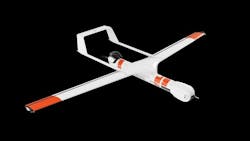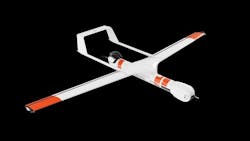Insitu launches ScanEagle3 UAS at Xponential 2018
BINGEN, Wash. Insitu, a wholly-owned subsidiary of The Boeing Company, in Bingen, Washington, is introducing ScanEagle3, its latest unmanned aircraft system (UAS), commonly referred to as a drone, at AUVSI's Xponential 2018 in Denver, Colorado on Tuesday, May 1.
Insitu engineers developed the company’s ScanEagle3 UAS to satisfy customers’ business needs and current and future fixed-wing UAS market demands. ScanEagle3's engineering and design draws from the best of the Insitu family of UAS products, including previous iterations of ScanEagle, as well as Integrator, officials say.
Using modularity, ScanEagle3 offers a significantly increased payload capacity, up to three payloads simultaneously, and is compatible with existing system components, such as INEXA Control and ICOMC2, as well as Insitu's family of launch and recovery equipment. This combination of payload capacity and flight performance comes at a price point similar to the ScanEagle.
"Our engineers have been very successful at reducing ScanEagle3 lifecycle costs and increasing operating efficiency — a huge win for both our customers and Insitu," Insitu Chief Technology Officer Matt Bartow says.
The flexible ScanEagle3 features a ground-adjustable aero-package, enabling a large center of gravity range for more payload integration options. Other enhancements include next-generation avionics designed for increased performance across multiple levels of criticality, a new purpose-built propulsion system that increases reliability while reducing lifecycle costs, and the same autopilot as RQ-21A Blackjack.
ScanEagle3 was designed as a commercial product to provide customers with the optimum combination of payload, endurance, mobility, and cost to support a wide range of business and operation needs — when the needs call for a medium-sized unmanned aerial vehicle system. The commercial approach provides benefits such as commercial pricing and global exportability through a commodity jurisdiction from the U.S. Department of State. ScanEagle3 is not covered by U.S. International Traffic in Arms Regulations (ITAR).
"ScanEagle3 provides our customers with a key capability that completes the use case and operational profiles for our UAS portfolio," Insitu's Chief Growth Officer Jon Damush explains. "Filling a critical gap between ScanEagle and Integrator, our intent from the start was to build a system that preserved all the best parts of the ScanEagle system, but gave customers additional payload capability to satisfy multiple payload missions. Simply put, by being able to simultaneously collect multiple data types during a flight improves efficiency and affordability."
ScanEagle3 offers:
- Significantly increased payload (up to three payloads simultaneously), increased flexibility and long endurance
- Compatibility with existing ScanEagle payloads, resulting in easy upgrading capabilities
- Use of the same ground launch and recovery equipment as ScanEagle and Integrator
- Complete integration with ICOMC2 and INEXA Control ground control station software, minimizing redundant training and maximizing vehicle-to-human ratio, while enabling multiple, dissimilar aircraft to fly simultaneously
- Adjustable wing positioning to provide flexibility for the aircraft's center of gravity, and rapid payload changes in the field
- Design focused on pursuing FAA Type Certification in the U.S. national airspace system (NAS)
- ITAR-free commercial baseline configuration, allowing accelerated global acquisition by customers
ScanEagle3 is simultaneous multi-mission capable for commercial operations including:
- Infrastructure, oil/gas and mining inspections
- Disaster response
- Day/night full-motion video
- Maritime surface search
- Escort and perimeter security
- Communications relay
- Electronic detection
- Maritime vessel tracking
- Wildfire monitoring
"We capitalized on the success of our previous ScanEagle, Integrator, and RQ-21A Blackjack products and services, and our more than one million operational flight hours operating in some of the world's most difficult environments," Damush adds. "Consistent with our heritage, we continue to evolve our products and anticipate customer need while simultaneously supporting our existing global customer base — as always — with our aviation professionals, world class UAS training and superior customer service."
With its headquarters in Bingen, Wash., and offices in the U.S., U.K., and Australia, Insitu creates and supports unmanned systems and software technology that deliver end-to-end solutions for collecting, processing, and understanding sensor data. To date, Insitu systems have accumulated more than one million flight hours. Insitu is a wholly-owned subsidiary of The Boeing Company.

